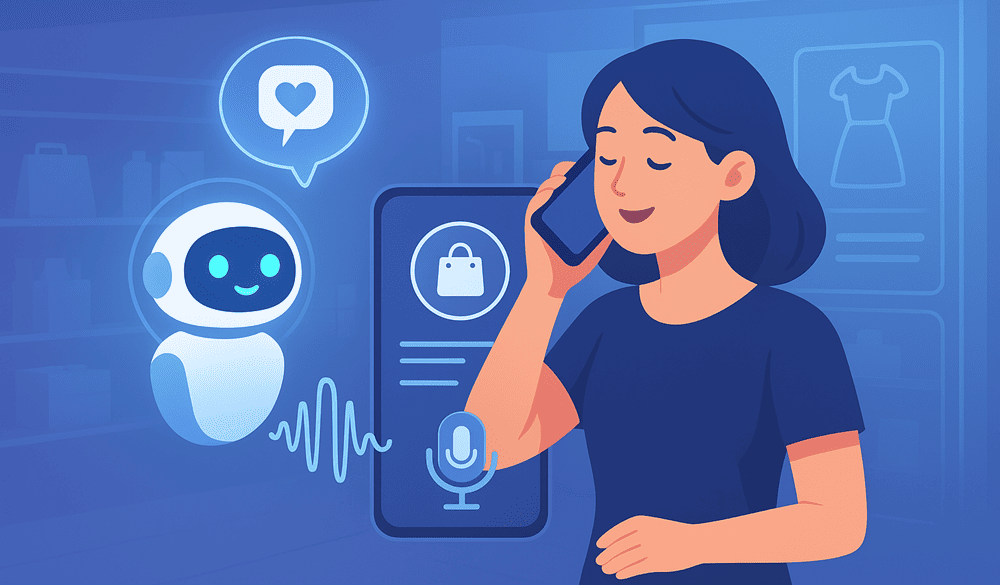The retail industry has always thrived on personal connections. From in-store assistants who remember customer preferences to loyalty programs designed to build long-term relationships, the goal has been the same—understanding what shoppers want and delivering it in the most convenient way possible. In today’s digital world, voice AI in retail is becoming the new channel to achieve that, bringing personalized shopping experiences over the phone.
Retailers are no longer just competing on price and product range. The real differentiator lies in customer experience, and that is where voice-based solutions step in.
Let’s explore how this technology is shaping the way people shop, engage, and reorder—all without lifting a finger.
Why Retail Needs Voice AI Today
Modern consumers expect quick, personalized, and effortless shopping experiences. According to a report by PwC, nearly 80% of customers want faster service and more tailored communication when interacting with businesses.
Retailers face challenges such as:
-
High inbound call volumes with repetitive queries
-
Difficulty in scaling customer engagement without overloading staff
-
Need for more human-like personalization in digital channels
-
Growing preference for convenient shopping beyond websites and apps
Voice AI in retail answers these challenges by giving businesses a scalable way to manage calls, provide recommendations, and even handle purchases. Instead of waiting in a queue or navigating a website, customers can simply speak to an AI-powered voice assistant and complete their shopping journey instantly.
How Voice AI Delivers Personalized Shopping Experiences
The magic of personalized shopping calls lies in how AI blends natural conversation with customer data. A phone call becomes more than just a support interaction—it turns into an opportunity to recommend, upsell, and delight.
Here’s how it works:
-
Understanding intent in real-time – Customers can say things like “I want to reorder my favorite coffee beans” or “What discounts are running on sneakers this week,” and the AI processes the request instantly.
-
Personalized product suggestions – Based on purchase history, browsing behavior, and preferences, the system tailors recommendations just like a helpful store assistant.
-
Seamless ordering process – Through ai voice orders, the assistant confirms availability, adds items to the cart, and finalizes payment securely over the phone.
-
Follow-up engagement – AI can send post-call confirmations, suggest add-ons, or schedule callbacks to keep the relationship active.
In other words, a phone call becomes a retail experience that feels one-to-one but is fully automated.
Benefits of Voice AI in Retail
Retailers implementing this technology are already reporting measurable improvements.
| Benefit | What It Means for Retailers |
|---|---|
| Faster Service | Customers complete orders in minutes without waiting in queues |
| Higher Conversions | Personalized recommendations lead to more purchases |
| Lower Costs | Automation reduces dependency on large call center teams |
| Consistent Experience | Every shopper gets the same quality of service, 24/7 |
| Stronger Engagement | Direct conversations improve customer trust and loyalty |
This combination of efficiency and personalization makes retail automation voice a compelling investment for both large chains and smaller businesses.
Use Cases: Where Voice AI Adds Value

The power of voice AI in retail is best seen in real-world scenarios.
1. Order Management
Customers can call in to place, track, or repeat orders through voice order assistant solutions. For example, a customer can say, “Reorder my monthly vitamins,” and the AI instantly processes the request.
2. Promotions and Discounts
During holiday seasons, AI can inform customers about ongoing sales, upsell related products, or even suggest gift bundles. This acts like a smart shopping assistant but over the phone.
3. Customer Support
Voice AI answers FAQs such as return policies, store hours, or delivery status. It frees human agents to handle only complex issues.
4. Personalized Recommendations
Instead of browsing hundreds of options, customers receive curated product suggestions. Think of it as a customer voice assistant that already knows what they like.
5. Loyalty Programs
AI can proactively remind customers about loyalty points, membership benefits, or exclusive offers, making interactions more engaging.
Why Retail Leaders Should Pay Attention
Forward-thinking retailers know the importance of blending human warmth with automation. Phone-based AI agents provide that balance—they sound natural, respond instantly, and adapt to customer needs.
For industry leaders, ignoring voice AI in retail could mean losing ground to competitors who are already delivering personalized service at scale. Consumers are moving beyond websites and mobile apps. Voice, being the most natural human interface, is quickly becoming their preferred shopping channel.
Overcoming Adoption Challenges
Of course, new technology always raises questions. Retailers often ask:
-
Will customers trust AI over the phone?
-
What about data privacy?
-
Can it really sound human enough?
The good news is that voice AI platforms are designed with compliance, security, and natural conversation in mind. Many systems even adapt to customer sentiment, making conversations smoother. And with ai customer engagement retail strategies, companies can gradually introduce voice AI alongside human support, ensuring a smooth transition.
Voice AI vs Traditional Retail Engagement
To better understand the impact, let’s compare traditional call centers with AI-driven engagement:
| Traditional Retail Calls | Voice AI Retail Calls |
|---|---|
| Long wait times | Immediate responses |
| Limited personalization | Tailored recommendations based on history |
| Higher staffing costs | Scalable with fewer agents |
| Reactive support only | Proactive engagement with offers |
The difference is clear voice AI agent solutions go beyond problem-solving to actively drive sales and loyalty.
Future of Voice AI in Retail
The next wave of retail innovation will not be just about faster checkouts or bigger discounts. It will be about personalized convenience. Voice AI is set to power:
-
Automated repeat orders for essentials
-
Personalized shopping calls that feel like talking to a trusted store assistant
-
Real-time inventory updates directly over the phone
-
Upselling through conversational engagement that doesn’t feel forced
For retailers, this means moving from transactional conversations to relationship-driven ones.
Key Takeaways for Retail Leaders
If you are exploring voice AI in retail, here’s a quick checklist:
-
Start small with high-volume, low-complexity use cases like reorders and FAQs
-
Integrate AI with CRM systems to personalize recommendations
-
Monitor performance—track call duration, conversion rates, and customer satisfaction
-
Use AI as a complement, not a replacement, for human staff
-
Keep evolving—adopt new features like voice sentiment recognition and predictive engagement
Final Thoughts
The shift from brick-and-mortar experiences to digital retail has always carried a risk of losing the human touch. With voice AI in retail, businesses can bridge that gap by bringing personalized shopping over the phone. It allows customers to buy, reorder, and explore products in the simplest way possible—through conversation.
For retailers, the opportunity is immense. By embracing smart shopping assistant tools, experimenting with ai voice orders, and improving ai customer engagement retail, they can stand out in a competitive market. More importantly, they can create experiences that customers actually remember.
As digital commerce continues to grow, those who adopt ai for ecommerce, invest in a customer voice assistant, and build strategies around ai voice sales will lead the future of retail. And those who hesitate may find themselves answering fewer calls—not because demand has dropped, but because customers are shopping with competitors who made the switch to voice AI agent solutions first.


